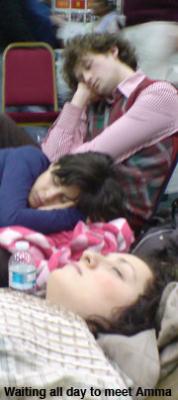
Alexandra Palace in north London on a grey morning in December – a Thursday. An Indian-looking man in a bright orange parka is guarding the driveway to the grand Victorian exhibition centre at the top of Alexandra Park. A banner next to him announces the presence of Amma – born Mata Amritanandamayi – “The hugging saint.”
White women in white saris, men clad in white, wearing beards, smiles, or looks of utter seriousness, make their way in and out of the main hall which, as their feet testify, you can only enter in socks.
Some consider her a deity. She was blue when she was born, it is said, indicating an incarnation of Krishna. That’s the sell, anyway: You feel blue, I have been blue, let me, Amma (Mamma) hug you. The catch? You’ll end up spending more on pakoras, samosas, chai and battered aubergine slices than you could ever dream.
I waste no time in collecting a token. It’s in the Ks. Amma is currently hugging the Bs – it’s a good few hours before my turn. At the opposite end of the arena, away from the alphabetical rows of seats filled with people waiting for their fix of divine-mother energy are stalls selling Amma-branded wares, with her own logo. At £60 ($120), the handmade and rather voodoo-like dolls were far too expensive for cuddly toys but probably reasonable for heavenly trinkets. The tannoy advertises “Amrita TV”, a cable channel broadcasting footage of devotees in ceremonies to other devotees.
Also on offer: bracelets and necklaces marked ‘worn’ – and thus ‘blessed’ – by Amma; shower cream, shampoo, soap, and in a car-boot-sale twist, a Leprechaun. (One blessing was surely that there were no Amma toilet rolls.)
Designated cashiers issue vouchers you can then shop with – ‘spiritual’ garments, iffy oil paintings of Amma, everything short of Amma Fried Chicken (she’s vegetarian).
Eventually I too am inched forward and then join a line on my knees. You surrender your glasses, any bags, disbelief and intelligence as your status shrinks. Then, before you know it, you are facing the woman herself, your every movement monitored and guided by the ushers.
Amma is doused in lime-smelling perfume and she has a hoarse motherly voice. She puts her head to your temple, mumbles a blessing, and you leave feeling rather elated. This elation can be explained: first and foremost, she does impart something, if only relief that the wait is over. Her disciples, as you approach her, cross you with a scented wax, like a lip gloss, leaving the pleasant smell. They even ask you what language you speak, although this is a con, Amma goes ‘mwoa-mwoa-mwoaa’, which translates into most languages as ‘mwoa-mwoa-mwoa’.
It would be disingenuous to say it’s not a good hug. Thousands flock to her. In the same way that a writer can send you into rapture with the turn of a final sentence, so Amma can with her expectation management and marketing technique. Amma worked for three days, taking a break in the mid-afternoons, and returning in the early evening for the long haul – 6pm to around 9am on the last sit, and, in a true sign of godliness, she doesn’t even take a pee break.
Ally Pally turns into a city of hug-seekers, children and adults milling about, people asleep in sleeping bags, waiting, lining up for food, in their hundreds, to be embraced. Now, she was on the stage, invoking the spirit of Devi Bhava (a business guru sacred to charlatanism), on a podium all dressed up wearing a crown. Oh, for a carpenter, half-naked on a cross or a smug fat bloke in robe, or a chap so humble he must in no shape or form be depicted. Impressively, though, Amma doesn’t shy away from people, there is no Popemobile distancing, she is truly hands-on. Access is her USP – you try hugging the Archbishop of Canterbury.






